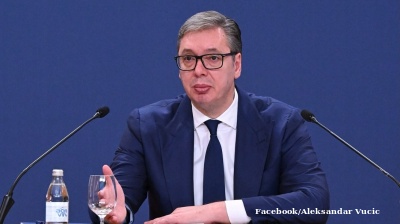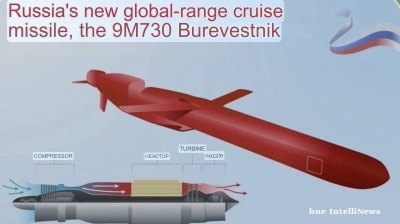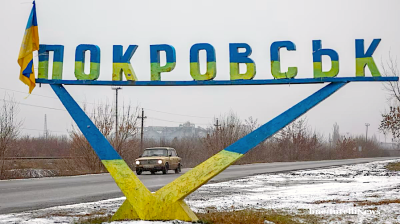There seem to be two kinds of Russian political figure: the quiet and the noisy. We tend to focus on the noisy ones for obvious reasons, but it is the quiet ones who tend to matter, and the case of Evgeny Prigozhin illustrates this perfectly.
He is, after all, an outspoken figure on social media, unafraid to label Defence Minister Sergei Shoigu a traitor, to denounce the military high command as incompetent bureaucrats, and St Petersburg Governor Alexander Beglov as ‘financially backing Ukrainian nationalists’. This has won him a bizarre and undeserved profile in the West, too, with some commentators breathlessly presuming he is after Shoigu’s job – or even Putin’s. This dramatically overstates his importance, even though the multifunctional manager has an unusual business trajectory, to say the least, from convict to chef to condottiere, with a business empire that has ranged from social media troll farms and African ‘authoritarianism support services’ to the organisation that now largely defines him, the mercenary army of ChVK Wagner. In this respect, he is the ultimate expression of Putin’s adhocracy, someone defined above all by the opportunities of the moment and the needs and whims of the monarch. In short, he does well by doing whatever the Kremlin needs doing today.
For such a beneficiary of the system – the claim that he is personally worth $1bn is commonly circulated, but implausible: FBK’s 2017 claim that he is a ruble billionaire ($13mn) is much more likely – Prigozhin seems to fail to understand basic aspects of it, though, and his growing political isolation, even as Wagner battles the Ukrainians on the ground, is a telling example of how Putin’s system works.
Useful vs Valuable
First of all, Prigozhin seems not to have appreciated that there is a difference between being useful and being valuable. In the first six months of the war, in particular, Russia suffered from a desperate lack of manpower in the war. Putin was unwilling to risk the political backlash either from a mobilisation of reservists or the deployment of conscripts, but peacetime-strength units simply could not operate properly on the battlefield. In different ways, Wagner had filled gaps in the past, not least allowing Moscow to support Syrian troops on the ground without admitting to the Russian people that this was not simply an arm’s-length, technowar intervention. Thus it seemed logical to turn to them again.
For a while, Prigozhin’s stock was high, because he was able to supply capable, experienced soldiers who could help fill the gap. When it became harder to recruit veterans – not least because the army was also trying to poach them – Prigozhin the ex-con would recruit perhaps 30,000-40,000 prisoners from the labour camp system. These men were badly disciplined and trained, but that didn’t matter, as they could be used as disposable troops to wear the Ukrainians down, force them to reveal their positions, and shield more effective units.
Prigozhin’s mistake was to confuse short-term utility with long-term value. Had the Kremlin opted to discard him, they could almost certainly have found some suitable ambitious and ruthless Prigozhin-a-like to fulfil the same role, even within the same structures. Prigozhin’s value depended on his utility, one that would decline as Putin did reluctantly authorise a partial mobilisation, which generated 300,000 fresh troops, not who he was. Prigozhin was not a friend or crony of Putin’s, not someone who was indispensable or irreplaceable. However, he took his temporary elevation for granted and began using it to prosecute his personal feuds, not least with Beglov and Shoigu.
Allies matter
This has proved a mistake, not simply because Prigozhin’s star was already at its apogee, ready to fall. It is also because, even in an autocracy, allies do matter. Prigozhin has always seemed to presume that so long as he had some access to Putin, that was the only relationship which mattered. To a degree this is true, although of course others – including Shoigu – have much better access to the boss. They are quiet usually, both because they have less to prove, but also because they can address Putin in private and don’t need to turn to Telegram to try to get his attention.
However, just as Putin’s position as the ultimate ‘decider’ in the Russian system does not mean that no other individuals or institutions matter, so too lateral alliances and understandings are also still powerful. Putin may issue the decrees, but what papers Security Council Secretary Nikolai Patrushev sees, what briefings Presidential Administration head Anton Vaino organises, and what private opinions cronies such as Yuri Kovalchuk or the Rotenberg brothers share out of the public gaze all help condition his sense of what to do.
Likewise, the Putin system is designed to be unstable and competitive, with factions forming and overlapping as they seek to influence him. To this end, having a wide array of allies and interests behind you not only maximises your chance of being able to get to Putin; it also increases the political costs of denying you what you are after. There are very few real mavericks in this system. Igor Sechin of Rosneft has few friends, but a strong personal tie to Putin. Ramzan Kadyrov is widely despised, but so long as he is regarded as the only man who can keep a lid on Chechnya, he needs to be kept sweet. National Guard head Viktor Zolotov has a certain ‘pariahs united’ affinity with Kadyrov, but is trusted by Putin as his guard-dog-in-chief.
And Prigozhin? This is a man who never seems to have looked for allies, only prey and targets. His inability to build any kind of a network of allies, or even make himself useful or agreeable to bigger beasts in the system, contrasts with Shoigu’s widespread array of contacts (and friendship with Putin). Even Beglov, who has hardly distinguished himself as governor, has a relationship with the president dating back to the 1990s and a wide range of lateral ties in his home town.
Pick your enemies carefully
Hence Prigozhin’s dilemma, as he realises the extent to which he is dependent on people with whom he has picked fights. In St Petersburg Beglov has rallied, thanks to a high-profile personal visit from Putin that was essentially a show of support. Furthermore, some of Prigozhin’s companies are now being leant on – ahem, investigated – by the Federal Security Service (FSB), in part because he was encroaching onto the turf of businesses under their protection, in part at Beglov’s instigation. Given that Prigozhin’s Concord group is based in the second city, this leaves him vulnerable.
More significant has been Shoigu’s creeping and quiet revenge. Wagner depended on access to the prison system to recruit, which it lost thanks to his lobbying. It relies on the Defence Ministry for ammunition and while there is no real evidence on the ground of any contraction in their fire support in Bakhmut, Wagner is clearly not getting the extra munitions it wanted. Shoigu’s military sidekick – and frequent Prigozhin target – General Valery Gerasimov is now in overall charge of the war and while Wagner has a degree of autonomy, Prigozhin cannot afford to be painted as the man undermining the war effort. Gerasimov has cycled some of Wagner’s forces away from Bakhmut, the key prize of the moment, and is pushing the rest into the battle, seemingly eager to see the mercenaries ground to nothing.
This was, after all, Prigozhin’s last and potentially fatal misunderstanding. There is a Darwinian process at work: no one rises in Putin’s system without being ruthless, opportunistic and, in their own very specific terms, effective. Putin spends his own political capital carefully, and largely relies on people to fight their own battles. Indeed, at present one of the very problems with the system is that he is relatively absent, not performing his crucial role of the arbiter of intra-elite disputes, and so what often matters is the relative power of respective sides.
Evolve or die
Without allies, facing a heterogenous array of enemies, Prigozhin is in trouble: the very volume of his statements attests to this. Much will depend on whether he can reinvent himself. The wild claims that he could become the leader of a party of disgruntled nationalists or even stage a coup fail to appreciate the complexities of the Putin system. It is remotely possible that Prigozhin may have a political career ahead of him – in a way, he has already taken over Vladimir Zhirinovsky’s role as the bugbear who says all the kind of lunatic things the Kremlin wants out there in public discourse yet open to being denied – but no party can be established without it being choreographed and approved by the Presidential Administration.
As for coups, apart from the fact that Wagner is being chewed away on the front, unable to recruit enough to make up for its losses, it is carefully watched by the FSB’s Military Counter-Intelligence Directorate, the Federal Protection Service and the Ministry of Defence. It depends on the last of these for ammunition and for mobility, so short of Prigozhin shelling out to buy a few thousand one-way rail tickets to Moscow, he could not even get his troops to the capital, never mind overcome the combined forces of the Kremlin Guard, the National Guard’s Dzerzhinsky Division and the army’s Taman and Kantemir divisions.
Yet Putin is also parsimonious. The final lesson of his system is that it is protean, changeable, and individuals can reinvent themselves. Alexei Kudrin went from critical insider to financial technocrat and now Yandex power behind the throne. Dmitry Medvedev went from liberal hope to clownish turbo-patriot. Prigozhin may yet survive, but only if he realises that the role of a figure like him in Putin’s adhocracy is to shut up and adapt to its changing needs – not to think he can define them himself by shouting a little louder.
Mark Galeotti is executive director of consultancy Mayak Intelligence and honorary professor at UCL School of Slavonic & East European Studies.
Opinion

A year after the Novi Sad disaster, Belgrade faces one crisis after another
Serbia’s government is grappling with a convergence of crises which threaten to erode President Aleksandar Vucic’s once-dominant position.

Don’t be fooled, Northern Cyprus’ new president is no opponent of Erdogan, says academic
Turkey’s powers-that-be said to have anticipated that Tufan Erhurman will pose no major threat.

COMMENT: Hungary’s investment slump shows signs of bottoming, but EU tensions still cast a long shadow
Hungary’s economy has fallen behind its Central European peers in recent years, and the root of this underperformance lies in a sharp and protracted collapse in investment. But a possible change of government next year could change things.

IMF: Global economic outlook shows modest change amid policy shifts and complex forces
Dialing down uncertainty, reducing vulnerabilities, and investing in innovation can help deliver durable economic gains.




